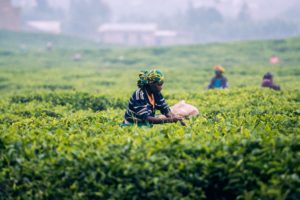Latest news
A report from Agriculture, Nutrition and Health Academy Week
Written by Kiron Jones
July 3, 2018
The Leverhulme Centre for Integrative Research on Agriculture and Health (LCIRAH) is an interdisciplinary research group that represents four University of London colleges: London School of Hygiene and Tropical Medicine (LSHTM), Royal Veterinary College (RVC), School of Oriental and African Studies (SOAS) and City, University of London. A key success has been establishing the Agriculture, Nutrition and Health (ANH) Academy Week, in partnership with the Innovative Methods and Metrics for Agriculture Nutrition Action (IMMANA) programme at LSHTM and the Agriculture for Nutrition and Health (A4NH) programme in Washington D.C.
The ANH Academy Week brings together researchers and users of research, cutting across disciplines and sectors. It aims to tackle the complex interactions between agriculture/food systems, nutrition, health and the environment; and facilitates sharing of innovative methods, metrics and emerging research findings. The week also seeks to strengthen research capacity, and there is a strong focus on informal discussions.
Broad representation and networking opportunities
The third ANH Academy Week was held in Accra, Ghana last week (25-29 June) following successful events in Nepal in 2017 and Ethiopia in 2016. By taking ANH to different locations each year, we aim to enable collaboration between colleagues from across the world. This year, 22 LCIRAH members attended, as well as over 350 people in total from 52 countries. The conference also featured particularly strong representation of African and Asian peers and young researchers, due in part to ANH Academy’s sponsorship of 20 highly-rated abstract presenters. This demonstrates the leadership that the ANH Academy is showing in international conferences.
Learning Labs
The week began with two days of Learning Labs on interdisciplinary agriculture, nutrition and health research. ANH Academy Partners delivered a broad mix of interactive training workshops that aimed to support the next generation of researchers and other stakeholders whose work relates to agriculture, nutrition and health. Topics included food systems, qualitative and quantitative methods and tools, gender and equity and research communication. Dr Mercy Lungaho of CIAT, Kenya commented, “It’s good to see case studies because it makes it easier to see what does and doesn’t work. I realised that this is not just academic — we’re really solving world problems.” The second day also included an IMMANA-led discussion panel and fair on methods and metrics. The fair was an interactive event where IMMANA-funded projects presented their emerging methods, metrics and tools including a scale to measure household-level water insecurity, a metric to assess vegetable intake, and a method of estimating post-harvest losses.
The Research Conference
The last three days of the Academy Week took the format of a more traditional research conference. We saw presentations, keynotes speeches, mini poster presentations and panel discussions. Day Three began with a powerful reminder that we need to accelerate our efforts to feed the world’s growing population in a way that is healthy, sustainable and just. Dr Amos Laar, President of the African Nutrition Society, called on researchers to work in partnership to fight malnutrition in all its forms to achieve the Sustainable Development Goals.
Day Four started with a focus on tools, methods and metrics. Presenters demonstrated innovative approaches to complex research challenges such as capturing seasonal patterns of energy expenditure and food intake. Other methods included measuring household water insecurity or estimating nutritional post-harvest losses.
A popular session on food policy for nutrition and health led to a research-donor-policy panel, which explored evidence-informed policymaking. Panellists stressed the need to better understand pathways between evidence and policy and build capacity for research uptake. They also called on attendees to identify champions and recognise the importance of context in which policy decisions are made.
Conclusions
The final day featured presentations on dietary transitions in both urban and rural settings. Furthermore a panel including government, civil society and donor representatives called for greater collaboration across disciplines and sectors as a way forward to tackle malnutrition. Bassirou Bonfoh, Director of the Swiss Center for Scientific Research, Ivory Coast, echoed these sentiments with a reminder that health sits firmly in the centre of the ANH nexus.
Summarising the conference, Rachel Lambert, Senior Livelihoods Adviser, DFID, and a key Funder of the event, praised the ANH Academy for its “success in convening different groups and disciplines. In this respect the Academy is unique, as no other network is equally interdisciplinary”.
Kiron Jones is co-ordinator of LCIRAH.
The ANH Academy is part of the three workstreams of the IMMANA programme. It aims to facilitate the sharing and adapting of methods and metrics developed through IMMANA Grants and Fellowships. It is also a broader partnership that aims to foster a community of researchers and users of research working at the intersection of agriculture, nutrition and health.
The ANH Academy is jointly founded and coordination is provided by the Leverhulme Centre on Integrative Research in Agriculture and Health (LCIRAH), IMMANA and CGIAR’s Research Program on Agriculture for Nutrition and Health (A4NH).’

